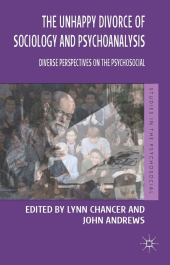 Neuerscheinungen 2014Stand: 2020-02-01 |
Schnellsuche
ISBN/Stichwort/Autor
|
Herderstraße 10
10625 Berlin
Tel.: 030 315 714 16
Fax 030 315 714 14
info@buchspektrum.de |

John Andrews, Lynn Chancer
(Beteiligte)
The Unhappy Divorce of Sociology and Psychoanalysis
Diverse Perspectives on the Psychosocial
Herausgegeben von Chancer, L.; Andrews, J.
2014. 2014. xxii, 427 S. 216 mm
Verlag/Jahr: SPRINGER PALGRAVE MACMILLAN; PALGRAVE MACMILLAN UK 2014
ISBN: 1-13-730457-X (113730457X)
Neue ISBN: 978-1-13-730457-5 (9781137304575)
Preis und Lieferzeit: Bitte klicken
A collection of 18 contributions by well-known scholars in and outside the US, The Unhappy Divorce of Sociology and Psychoanalysis shows how sociology has much to gain from incorporating rather than overlooking or marginalizing psychoanalysis and psychosocial approaches to a wide range of social topics.
Preface; Jeffrey Alexander Foreword; Craig Calhoun Introduction: The Unfulfilled Promise: From Marginalization to Revitalization; Lynn S. Chancer and John Andrews PART I: THE HISTORY OF SOCIOLOGY AND PSYCHOANALYSIS IN THE US: DIVERSE PERSPECTIVES ON A LONGSTANDING RELATIONSHIP 1. Opening/Closing the Sociological Mind to Psychoanalysis; George Cavalletto and Catherine Silver 2. Paranoid and Institutional Responses to Psychoanalysis Among Early Sociologists: A Socio-psychoanalytic Interpretation; Catherine Silver 3. The Unconscious in Cultural Dispute: On the Ethics of Psychosocial Discovery; Thomas DeGloma PART II: ARE PSYCHOSOCIAL/SOCIOANALYTIC SYNTHESES POSSIBLE? 4. Sustaining an Unlikely Marriage: Biographical, Theoretical, and Intellectual Notes; Neil Smelser 5. Why is it Easy to be a Psychoanalyst and a Feminist, but not a Psychoanalyst and a Social Scientist? Reflections of a Psychoanalytic Hybrid; Nancy Chodorow 6: The Narcissism of Minor Differences: The Status Anxiety & Disciplinary Intolerance between Sociology and Psychoanalysis; Siamak Mohavedi PART III: THE UNFULFILLED PROMISE OF PSYCHOANALYSIS AND SOCIOLOGICAL THEORY 7. Escapes from Freedom: Political Extremism, Conspiracy Theories and the Sociology of Emotions; Neil McLaughlin 8. C. Wright Mills, Freud and the Psychosocial Imagination; Lynn S. Chancer 9. Bourdieu, Socio-analysis and Psycho-analysis; George Steinmetz 10. The Ethnographic Spiral: Reflections on the Intersection of Life history and Ideal-Typical Analysis; Philip Manning PART IV: THE PSYCHOSOCIAL(ANALYTIC) IN RESEARCH AND PRACTICE The Psychoanalytic Underpinnings of Subject (Object) Selection? 11. PERSONA: Psychodynamic and Sociological Dimensions of a Project on US Activism and Political Violence; Gilda Zwerman Applying Freud´s Ideas to Contemporary Culture 12. Foreclosure from Freud to Fannie Mae; John Andrews 13. ´Mourning becomes Eclectic´: Racial Melancholia in an Age of Reconciliation; Jeffery Prager 14. On The Melancholia of New Individualism; Anthony Elliot 15. The Shame of Survival: Rethinking Trauma´s Aftermath; Arlene Stein Integrating Sociological Subfields and Psycho/analytic Frameworks 16: Racial Hatred and Racial Prejudice: A Difference That Makes a Difference; Tony Jefferson 17. Definitive Exclusions: The Social Fact and the Subjects of Neo-Liberalism; Vikash Singh 18: ´One Has to Belong, Somehow´: Acts of Belonging at the Intersection of Ethnicity, Sexuality, and Citizenship; Ilgin Yorukoglu
"Editors Lynn Chancer and James Andrews have gathered together in The Unhappy Divorce of Sociology and Psychoanalysis a notable group of scholars who have studied this rich legacy and who carry on the tradition today. ... These essays and several others contain enriching insights for sociologists. ... To overcome our collective resistance to individuality, we may not need the couch, but we definitely need this book." (Christine Williams, Contemporary Sociology, Vol. 46 (1), January, 2017)
´The volume does deliver what it promises diverse perspectives on the psycho-social, and this is its biggest merit. As is indeed the fact that it triggers an awareness raising process, and this is also why it should not be ignored.´ - LSE Review of Books


